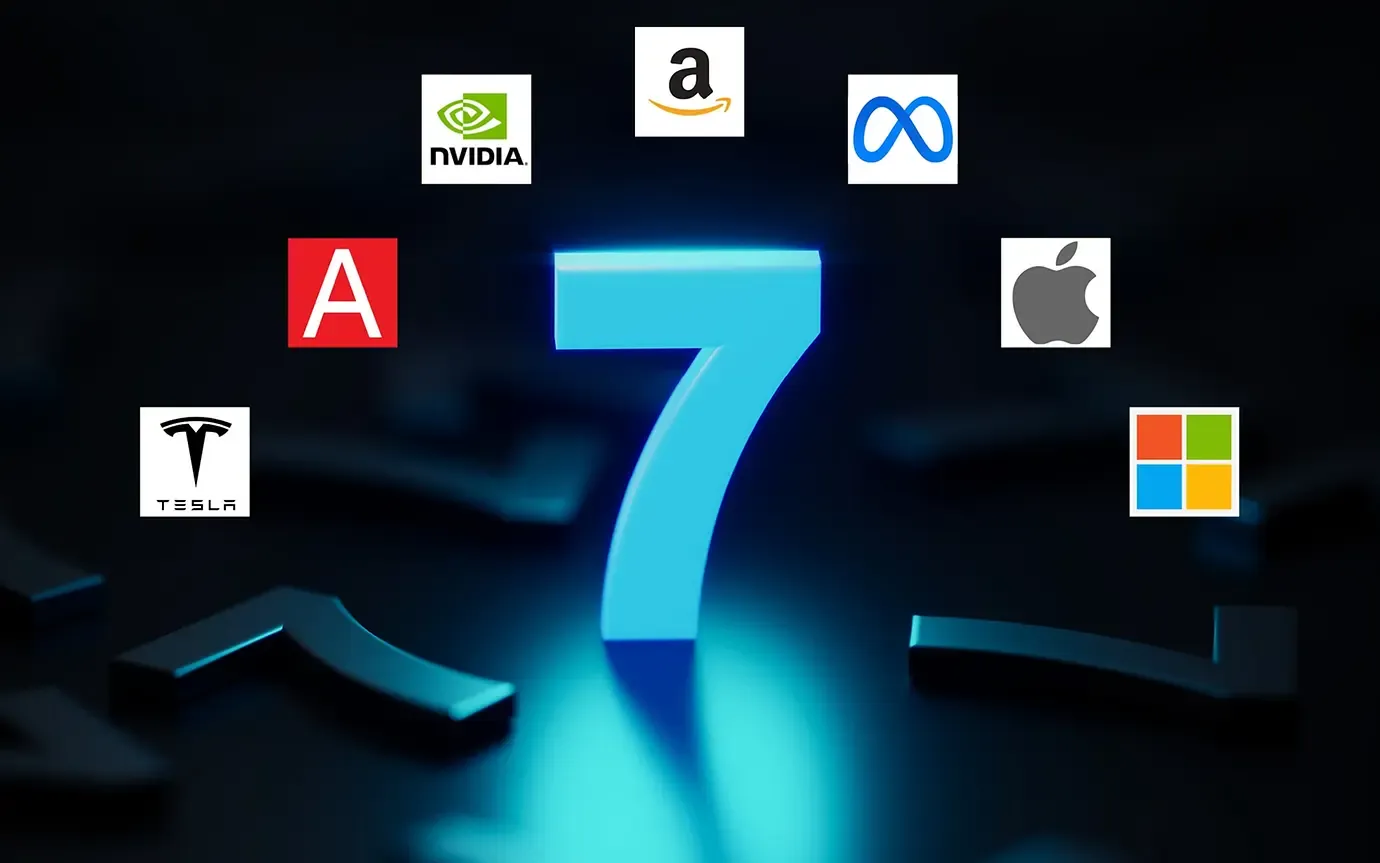Wall Street’s beloved group of tech giants, the Magnificent Seven, may no longer fully capture the story of market leadership. Investors are now experimenting with fresh labels the Great Eight, the Golden Dozen, or even the TenAI of GenAI to reflect a broader set of companies driving the artificial intelligence boom.
It’s been nearly three years since OpenAI’s ChatGPT propelled AI into the global economic spotlight, and in that time, one trade has dominated U.S. markets: buying the Mag Seven. This elite group Nvidia, Microsoft, Apple, Alphabet, Amazon, Meta, and Tesla was seen as best positioned to deliver oversized returns during the most transformative technology shift since the internet.
While that bet has largely worked, the AI boom has since expanded beyond its original champions. Investors sticking strictly to the Mag Seven risk overlooking other emerging winners. Broadcom, Oracle, and Palantir, for instance, are increasingly recognized as vital players in an AI-powered future. Notably, the Mag Seven alone accounted for more than half of the S&P 500’s impressive 70%-plus rally since early 2023.
“Just because the Mag Seven dominated past waves mobile, the internet, e-commerce doesn’t mean they’ll dominate AI,” said Chris Smith, portfolio manager at Artisan Partners’ Antero Peak Group, which oversees $2.4 billion. “The next winners will be those tackling massive markets through AI, potentially surpassing today’s leaders.”
To be clear, the Magnificent Seven isn’t fading away. Collectively, the group represents nearly 35% of the S&P 500, and Bloomberg Intelligence projects their earnings will jump more than 15% in 2026, supported by 13% revenue growth. That still outpaces the rest of the index, which is forecast to see earnings climb 13% and revenue 5.5%.
But performance within the group is diverging. Nvidia, Alphabet, Meta, and Microsoft are thriving on AI adoption, with shares rising between 21% and 33% this year. Apple, Amazon, and Tesla, however, are struggling to keep pace, weighed down by uncertain growth prospects. “It’s hard to argue the Mag Seven still fully represents the AI story,” Smith noted.
That’s why Wall Street is experimenting with new groupings. Some strategists suggest a “Fab Four” Nvidia, Microsoft, Meta, and Amazon. Seaport Research’s Jonathan Golub prefers a “Big Six” that excludes Tesla. Ben Reitzes at Melius Research favors an “Elite Eight,” adding Broadcom to the lineup.
Yet even these variations miss key players. Oracle’s stock has surged over 75% this year on the strength of its AI-driven cloud business. Palantir has been the standout in the Nasdaq 100, skyrocketing 135% in 2025 thanks to robust demand for its AI software. “As AI evolves, new winners will emerge sometimes at the expense of old ones,” said Jurrien Timmer, global macro director at Fidelity Investments, which oversees $16.4 trillion.
The practice of bundling buzzy stocks is nothing new. Investors remember the Nifty Fifty of the 1960s, the Four Horsemen of the dot-com era, and the FAANGs that defined the smartphone age. Each dominated its time, only to give way to the next wave. AI seems destined to follow the same script.
Reflecting that shift, Cboe Global Markets recently unveiled futures and options on its new Magnificent 10 Index. This basket adds Broadcom, Palantir, and AMD to the original seven. But the subjectivity of such lists is clear Oracle, despite strong AI-driven gains and one of its best trading days in decades, was left out.
“We need to broaden the conversation beyond the Mag Seven,” said Nick Schommer, a portfolio manager overseeing $34.7 billion at Janus Henderson. “Oracle and Broadcom absolutely deserve a spot.”
Analysts are also flagging other companies as essential to AI’s next chapter. Taiwan Semiconductor is viewed as a backbone of the AI chip supply chain. Palantir remains one of the few standout AI software firms, while legacy players like Salesforce and Adobe face skepticism about their relevance.
Among the “less magnificent,” Apple and Tesla face the most scrutiny. Apple’s growth lags peers, and its AI push trails rivals. Tesla, meanwhile, is grappling with slowing EV sales and mounting competition. Still, loyal investors see potential in Apple’s iPhone as a gateway to AI applications, and in Tesla’s ambitious AI projects, from autonomous driving to humanoid robots.
The AI boom also extends into infrastructure. Utilities, networking companies like Arista Networks, memory suppliers such as Micron, and storage leaders including Western Digital and Seagate are benefiting from surging demand to power and store AI applications.
Adding to the complexity, many AI frontrunners remain private. OpenAI, reportedly eyeing a $500 billion valuation, isn’t accessible to public investors. Neither are Anthropic or SpaceX. Their absence leaves public markets focused on a narrower set of AI beneficiaries.
As AI adoption spreads, the beneficiaries will evolve from those building the infrastructure, to firms offering AI-specific solutions, to companies harnessing AI to transform their businesses. Each stage could shuffle market leadership.
“As that evolution plays out, today’s leaders may grow expensive and their momentum could fade,” Fidelity’s Timmer warned. “The risk in a concentrated market is that when leadership rotates, it can be disruptive. We don’t yet know if the Mag Seven era ends in a smooth transition or with a sharp correction.”
For now, one thing is certain: AI is rewriting Wall Street’s playbook, and the list of winners is still expanding.

Subscribe to our newsletter!
As a leading independent research provider, TradeAlgo keeps you connected from anywhere.








